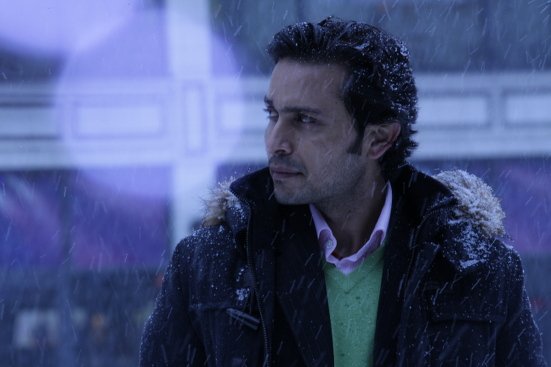





<Review by: Swati Sharan>
Directed by Nitin Chandra. Starring Kranti Prakash Jha, Anurita Jha, Pankaj Jha
Mithili Makhaan is a compelling lore of what happens when mass rural migration occurs amidst a dilapidated state of affairs. The film starts with protagonist Kranti Prakash (Kranti Prakash Jha) yearning for his visit home to India in the Mithila district of Bihar while sitting in his Toronto office. He wishes he could be innovative rather than just be an ordinary engineer with an MBA. Kranti then sets off on a trip to his rural hometown to perform sacred rites.
While there, he seeks to visit all the places he would go to when he was a kid. But alas, all the places are now in ruins. And many of the people he once knew are no longer there as they’ve left for better opportunities.
Simultaneously, Kranti meets Maithili (Anurita Jha) who has made the brave choice to stay on and be part of an NGO which sells Mithila or Madhubani paintings for which there’s great demand abroad but not at home.
Through Maithili and her compassionate heart, Kranti is inspired to leave his job in Canada and settle down in his hometown by starting a makhaana (lotus seed) processing plant. He finally feels he can put his MBA to good use and help uplift fellow community members. Little does he realise, however, the circumstances are against him with poor law and order, feudalistic mentalities, competing rivals and a difficult mother. Can Kranti make the social difference he seeks or is he better off sitting in Canada?
Winner of a National Film Award, the story is perhaps the bitter revelation of what consistent degradation has brought to many areas of Bihar post the 1970s. But more than just the political and social decline, the film seeks to bring attention to the idea of well-off people taking personal responsibility to maintain and make things better.
It points to a multitude of things. One of them is the need for more entrepreneurial development while another is about people’s feelings of shame in owning up to their regional heritage. The film repeatedly points to the different levels on which the latter is occurring. One is the shame Biharis developed in speaking their regional dialects therein endangering them. The other is in not creating anything new as well as degradating heritage sites and not acknowledging what they stand for. The third is perhaps the most critical point because Biharis feel so much shame or are so bewildered by the socio-political situation, the well-off tend not to give back to the community.
The film is a story about Bihar through the lens of a Bihari. The stars have all given excellent performances and have played their parts authentically. The visuals and direction are also engaging and the plot is quite consistent. While I feel the film could have ended differently and it would have been nice to see more of Maithili and her story, overall, I encourage everyone to watch it.
Read our interview with the director, Nitin Neeru Chandra, here.
- Kranti Prakash Jha in Mithila Makhaan
- Pankaj Jha in Mithila Makhaan
- Pankaj Jha in Mithila Makhaan
- A scene from Mithila Makhaan







0
comments